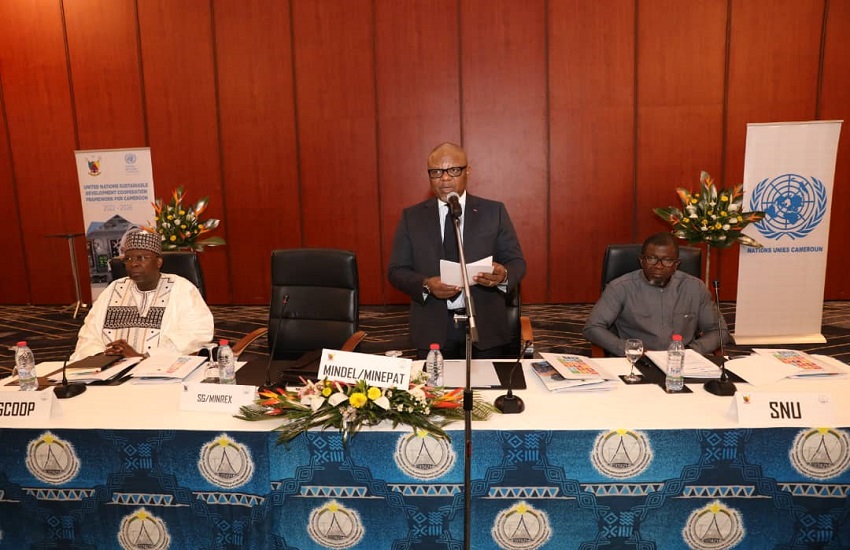The Minister Delegate to the Minister of the Economy, Planning and Regional Development in charge of Planning, Paul Tasong has chaired over the first Steering Committee meeting of the United Nations Cooperation Framework for Sustainable Development (UNSDCF) in the presence of the Outgoing United Nations Resident Coordinator in Cameroon, Mathias Zana Naab, on 21 June 2023 in Yaoundé.
This first meeting had as objectives explaining the terms of reference of the Framework to the respective development partners and to inform the steering committee on some of the key achievements of the UNSDCF in 2022, while highlighting some of the priority areas that Cameroon-United Nations framework will be focusing on in 2023.
While opening the meeting, the Minister Delegate underscored that United Nations Cooperation Framework for Sustainable Development is a plan which aims to make Cameroon “a land of opportunity, civic engagement and well-being for its people”. He said that it is structured around four strategic priorities which are: inclusive and sustainable growth; high quality, inclusive and equitable human and social development; institutional support and citizen partnership and environmental and effective management of climate risks. Minister Paul Tasong also reiterated that these four strategic priorities are fully aligned with the pillars of the NDS30, in accordance with the principles of the Paris Declaration on Development effectiveness
During the meeting, the UNSDCF which was implemented in 2022 was appreciated under three major presentations; The first was a presentation on the role of the UNSDCF Steering Committee, the second was on the UNSDCF’s results in the domain of Reducing Gender Inequalities and Empowering Youth, Women, Girls and Other Vulnerable Groups and the third, was on UNSDCF’s results in the aspect of Institutional Support and Citizen Participation.
At the end of the discussions many recommendations were made to render the Framework more efficient in its purpose of achieving Sustainable development. Amongst them were, the need to lay more emphasis on assisting the underprivileged and helping the small and medium sized enterprises. In the same vein amongst others, MINEPAT and the UN were urged to involve the Local Development Authorities at the operational level.
Speaking to the Press at the end of this first Steering Committee meeting, the outgoing Resident Coordinator of the United Nations Mathias Zana Naab said that from the presented results, the United Nations wants to focus on universal health coverage, supporting government on prioritizing climate change resilience while at the same time looking at ways to be able to mobilize climate change financing for the country, and supporting government in helping more women and girls have access to education. He equally talked of enhancing economic empowerment while at the same time looking at prioritizing the efforts of the government in the crisis hit areas of the country especially the Far North, Northwest and Southwest regions.
This meeting was equally an opportunity for the Outgoing UN Resident Coordinator to express his heartfelt appreciation to government, the different partners present and in a special way his staff; as he explained to them that it was his first and last meeting with the steering committee, while affirming to the government on behalf of his staff that the recommendations will be implemented even when he’s gone.
The United Nations Cooperation Framework for Sustainable Development which constitutes the reference framework for United Nations interventions in Cameroon for the period 2022-2026, was signed on September 16, 2021 by Cameroon and all the UN Agencies. The cost of implementing it is estimated at 1.152billion US dollars of which 33.5 has already been mobilized through the regular resources of the United Nations System. Minister Tasong explained that the remainder will have to be raised from government and donors, hence the need to strengthen the partnership with other stakeholders in order to mobilize the remaining resources.



